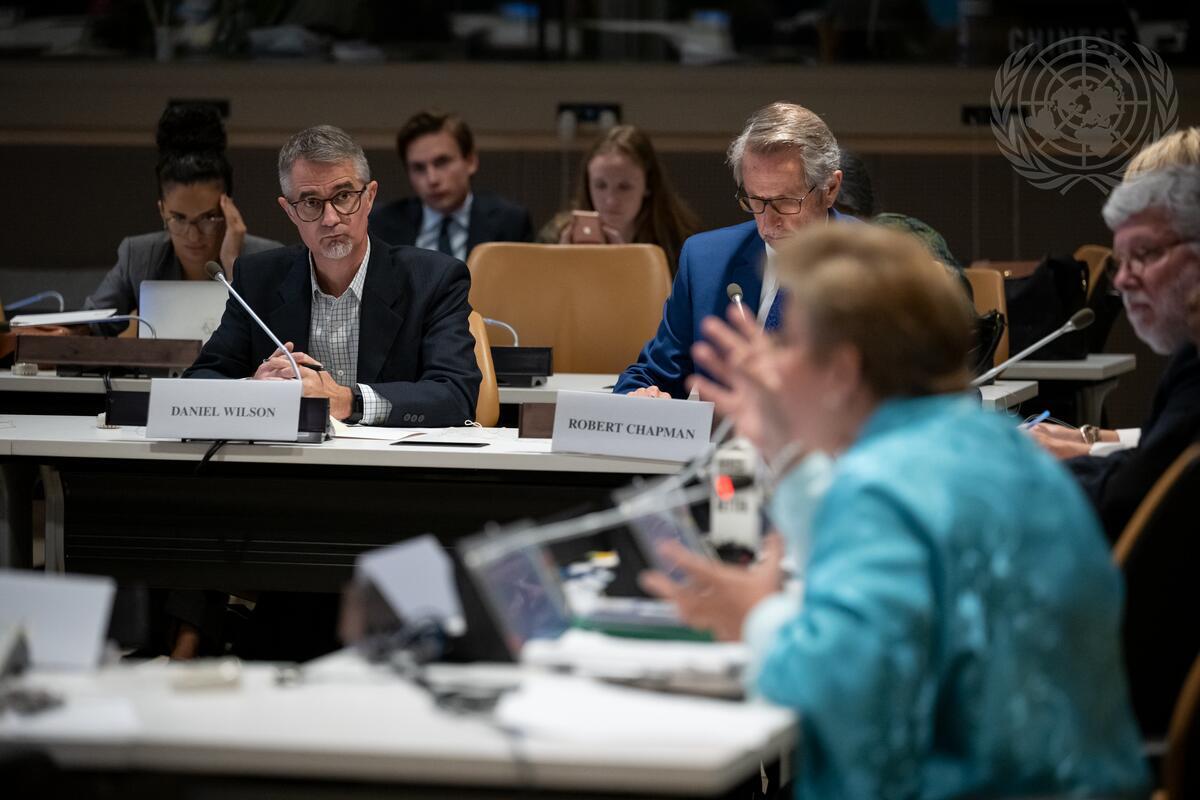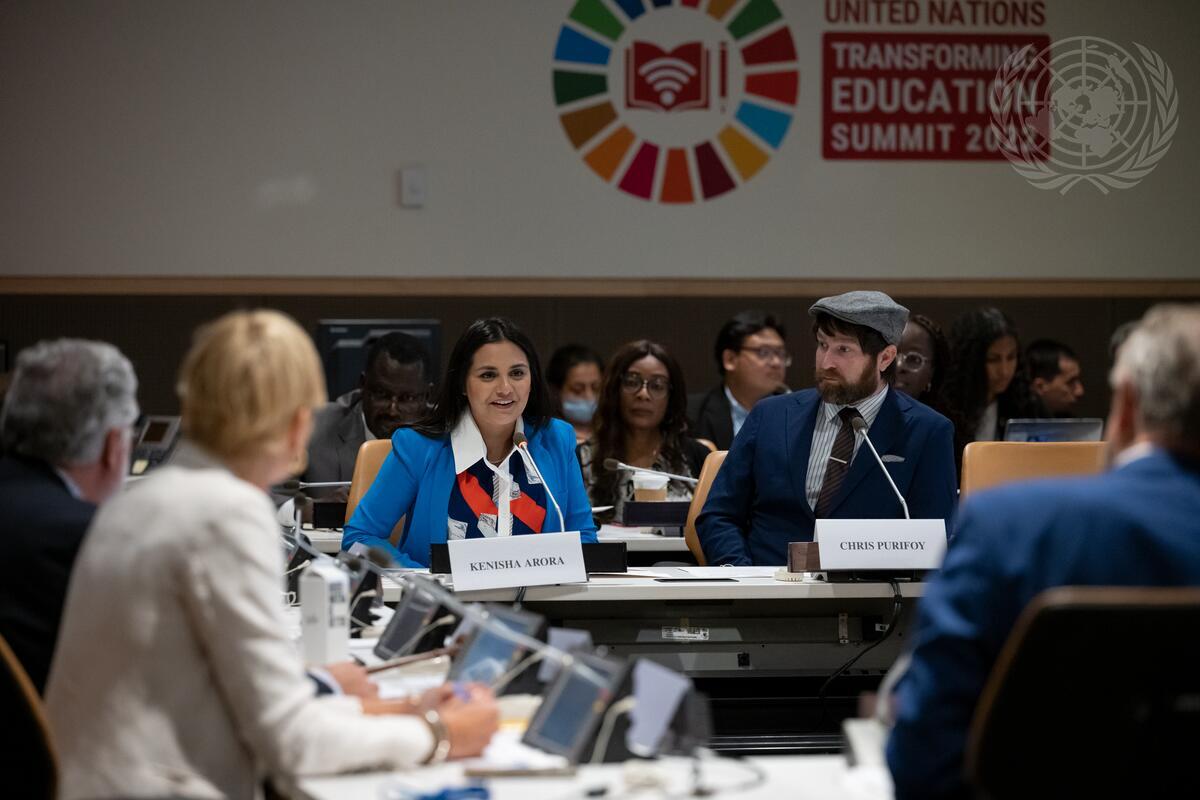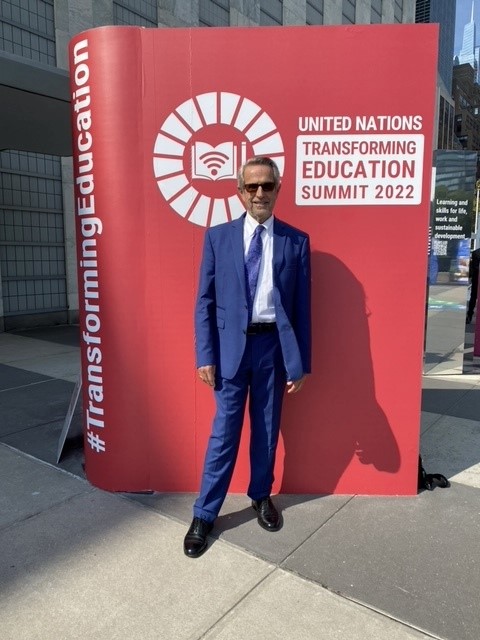Over the years, I’ve had the privilege to present our Truly Human Leadership journey to many different audiences.
Whether to leaders in the U.S. Congress, the U.S. Military, or the healthcare industry, global CEOs, the Aspen Ideas Festival, or to business schools such as Harvard University, Fordham, Washington, University in St. Louis and others, my goal has been
the same.
Through the Barry-Wehmiller story, I want to show people the impact business can have on people’s lives. That business can be a powerful force for good. That the way we lead impacts the way people live.
A couple of weeks ago, I was invited to highlight our initiatives at all levels to bring our message to educational institutions during the United Nations Transforming Education Summit on
a panel organized by PRME (Principles for Responsible Management Education.) You can watch my presentation in the video below:
This is how Sanda Ojiambo, Assistant Secretary-General and Executive Director and CEO of the U.N. Global Compact, described the panel in which I participated, “Educate the Educator: Transformative Pedagogies for Innovative Leadership Skills in the
Private Sector.”
There is an urgent need to call for system-level commitment from governments, private sector, and business schools and universities in a mutual bottom-up/top-down approach to change the role of higher education institution educators by developing actionable,
rewarded and institutionally supported practices and pedagogies that will scale up innovative global management education towards the (sustainable development goals.)
 As PRME said in their press release of the event: “Traditionally,
business schools and business faculties have not been sufficiently equipped with the holistic training necessary to give students the tools to address the world’s systemic problems as future managers and leaders.”
As PRME said in their press release of the event: “Traditionally,
business schools and business faculties have not been sufficiently equipped with the holistic training necessary to give students the tools to address the world’s systemic problems as future managers and leaders.”
I would change the last line of that statement to say that students haven’t been given the tools to address the world’s systemic problems as future leaders. They’re being taught to be managers already. What they need to be taught is
how to be leaders.
As I often say, I define management as the manipulation of others for your success. But leadership is the stewardship of the lives entrusted to you. A profound difference. What we are suffering from in this world is leadership malpractice
and I am proud to have presented that perspective to the U.N.
I was invited to speak at the Transforming Education Summit by Mette Morsing, Head of PRME. PRME has a mandate from the United Nations' Secretary General to transform management education.
Today, PRME is the U.N.'s largest global initiative on sustainability in leadership education for the SDGs, Sustainable Development Goals.

I met Mette through our work with the Humanistic Leadership Academy, of which PRME is a partner organization. You’ll recall that this group – comprised of business leaders and professors from around the world – have a goal to transform business education to be more humanistic and people-oriented. They want to
transform business education from being institutions that train people to “manage” into institutions that foster humanistic leaders who honor individual dignity and demonstrate the courage to care for others.
The Humanistic Leadership Academy recently had another meeting of cohorts at our BW Papersystems facility in Phillips, Wisconsin. Their numbers are growing and you can following along with their progress or join the effort yourself on their new website.
Leading this focused effort are BW’s Director of Strategy, Improvement and Culture, Brian Wellinghoff, and Michael Pirson, an Associate Professor of Management, Global Sustainability, and Social Entrepreneurship at Fordham University and Research Fellow at Harvard University.
We very excited that through Brian’s work with the Humanistic Business Academy, he has been invited to speak at the Human Flourishing Forum, a two-day event November 3-4 at the Vatican.

The Human Flourishing Forum is a gathering of luminaries and stakeholders to explore human flourishing research efforts to-date and facilitate closer collaboration between academic, government and corporate actors invested in ensuring every person on
Earth understands what they need to flourish. The Forum is intended to catalyze both awareness and action towards accelerating human flourishing.
Within the span of a couple of months, the principles of Truly Human Leadership and the change they can bring to business and to people’s lives will be presented at the U.N. and the Vatican!
We at Barry-Wehmiller have been blessed with a message that can change the world. We’ve seen the change it brought to our company and the lives of those here within our span of care. As we were told a long time ago, we would be selfish if we did
not share our experience with others.
It is rewarding to have the opportunity to share our message to organizations with worldwide reach like the U.N. and the Vatican and we will continue to share it far and wide until Truly Human Leadership is not the outlier, it is the norm.
(All photos courtesy of the United Nations)
Here is a transcript of Bob Chapman's remarks to the UN:
Thank you for this opportunity. What I want to talk to you about is my journey from management to leadership. I define the word management to mean the manipulation of others for your success. And the word leadership means the stewardship of the lives entrusted to you.
I have a very traditional background, accounting degree, MBA, went into Price Waterhouse and then entered a struggling family business. Very traditional business background. So how did I get to where I am today with the chance to share this bunch? Because I believe some higher power has blessed me with a message that would change the world.
And that transformation happened to me about 20 years ago. The major one was at a wedding when I saw a friend of mine walking his daughter down the aisle and everybody oohed and aahed, how precious she was and how handsome this young man was. And as I observed that traditional practice, having walked my two daughters on the aisle, all of a sudden I had a revelation. Prior to that wedding, I saw the 12,000 people in our organization as functions. I had engineers, accountants, receptionists, hourly workers, production workers, union workers. We used the language that described people by their function. I was a nice guy. We had a nice company. We were doing fine. But the lens through which I saw, as a manager of the world, these people were here for our success.
That day at a wedding, I all of a sudden, realized the lens went exactly the opposite. And I saw people, not as functions anymore, as somebody's precious child that has been brought into this world with the expectations of their parents, that that child would get to be whoever they were intended to be. And I realized that day, that I had been blessed with a message that business could be the most powerful force for good in the world. We have people in our care for 40 hours a week. We have a chance, if we are good stewards of those lives, if we see that those lives as our purpose, we could change the world dramatically. So after that revelation, I realized that I have been given this blessing, this calling, this message to change the world. And I realized that we couldn't ask people to move from management to leadership. We had to teach them how to do that. You can't ask people to care. You have to teach them how to care. That's our experience.
And what I'm sharing with you is not an academic theory. I'm sharing with you now what we've been told. A gentleman named Bill Ury, worked here at the United Nations, in world peace organization. Bill Ury, a world peace negotiator for the last 35 years at Harvard, heard about our culture from Simon Sinek, and he came in and spent two days talking to our people. After two days of talking to our people, not me, our people. He said he saw the answer to world peace.
Now that is ridiculous. How do you go to a manufacturing company and see the answer to world peace? So, I said, "Bill, help me understand that." He said, "Bob, I saw a place where people genuinely care for each other." That is the world he imagined where we have world peace. And when we peeled it back, what happened is, he said, "It's amazing how many people describe the company as a family." He said, "They don't describe it like a family. They describe it as a family."
Now, these people are not related to each other, other than through mankind. Why do they use the word family? Because what does family mean? It means the place of ultimate care and love. That's what it should mean, a place. And so, people describe their experience here as a family, which means they feel safe, valued. So, what we realized is that we needed to begin to teach this. So, we put a team together because I was worried that this blessing I was given would die with me.
And so, we began. We put a team together and said, how are we going to transform these managers that our university has created into leaders who genuinely care, have the skills and courage to care for the people they lead? So, we put together this collective team and we teach three fundamental things in our university.
And the first, which you all mentioned, is empathetic listening. We have learned that the most powerful skill for all human relations is empathetic listening, not listening to debate or judge, but listening to understand and validate. It is transformative. We also teach, Cynthia and I, raised six kids. One of the things we learned, if you don't compliment your kids five times more, you suggest things they do better, it's difficult. So, we brought a class into our university where we teach recognition and celebration. How do you let people know they matter, in timely, thoughtful, meaningful ways? And the third class, the fundamental class is, culture of service, seizing the opportunity to serve others.
Now, we have been teaching that for about 15 years around the world. And I will tell you that what amazes me is, 95 percent of the feedback we get from our graduates is how it affects their marriage and their relationship with their children. I was never taught, and I never heard, never read that the way I would run our global company would affect people's personal lives other than salary and benefits. But when we teach people how to be leaders, they tell us they're better husbands, better wives, better parents, better citizens. So, we then realized that this gift, again, was profound.
And on the listening side, when Bill Ury was in our plant, he said, Bob, and again, I'm in the United Nations, so I want to share this, "I've been going to global peace talks for 35 years, and I now realize that's what they are. They're global peace talks." The reason we have issues in the world, the reason we can't work out our differences in the world is because we don't know how to listen with empathy. If we want to heal the world, there is nothing more powerful than our educational system, from kindergarten through graduate school, to teach people human skills that begins with listening to understand. So, in this journey, today, we have our internal university where we teach people to move from management to leadership, from using people to caring for people.
It was so powerful that we decided, and again, people came in from McKinsey and Harvard, and Harvard did a case study on our culture, and they told us last fall, it's now a Harvard bestseller. 70 universities all over the world use it to teach our culture of caring. Our book has sold over 80,000 copies, which is titled, Everybody Matters: the Extraordinary Power of Caring for People like Family.
So, the word that I want you to walk away with, my opening remarks is, the word "caring". You cannot ask people to care for others. You have to teach people how to care. And when you do, we could change the world tomorrow because one of the things we've learned in this listening program is that we were each born with different characteristics, which we accept. The color of our hair, skin, et cetera. But we are also born with a personality type that creates the lens through which we experienced the world. We didn't choose that lens, any more than we chose the color of our hair. But that lens shapes the way we see the world. That is why two people today, from the same family, can look at the same situation and see it entirely differently. It's not that I'm right and you're wrong. It is the lens that you have shaped by your personality, forms the way you see the world. So when we see all the conflict in the world, honestly, it is because we teach in our schools speech and debate.
Which one do we forget? Listening. The greatest of all skills we have learned in this journey of 20 years is when you teach people to listen with empathy, not listen to debate, but listen to understand. We could heal the brokenness we see in the world tomorrow. There is nothing more powerful in the United Nations than if they would create a listening movement in the world where we would teach in every country in the world. We teach this all over the world in our organization. We get the exact same feedback.
So I want to leave you with, there's no question in my mind, as Simon Sinek said, "If it exists, it must be possible." We run a 12,000 person global organization that people like Bill Ury, Simon Sinek, have come and said they have never seen anything like it. How is that possible, I'm an accountant from Ferguson? Because I've been blessed with a message that could change the world. Thank you.